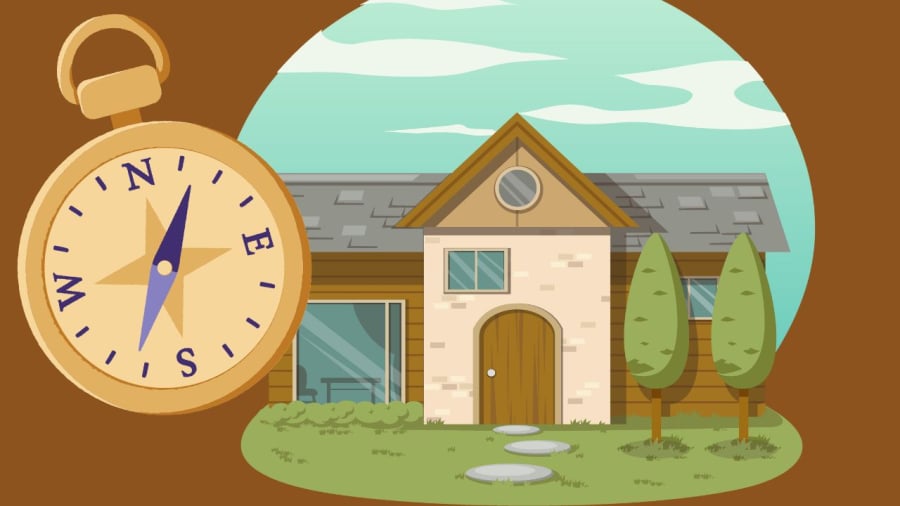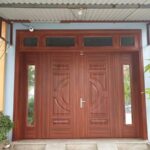Why is the West Direction Considered Inauspicious in Feng Shui?
When it comes to residential Feng Shui, selecting the right direction for your home is of utmost importance. The ancient practice dictates that the direction of your home can have a significant impact on your health, wealth, and overall well-being.
Traditional beliefs hold that building a house facing west is undesirable. The main concern stems from the intense afternoon sun, as the low-angle light can heat up the interior, making it uncomfortable and potentially harmful to the residents’ health. In ancient times, homes lacked modern cooling systems like fans and air conditioners, relying solely on natural ventilation for comfort.

House Direction Plays a Crucial Role in Feng Shui
Ancients preferred houses facing south or southeast to avoid the harsh morning and afternoon sun and the cold northern winds. The southern orientation provides a pleasant breeze and ample sunlight without the glare, while western-facing homes can become unbearably hot and stuffy, potentially leading to health issues.
The intense western sun can also hinder plant growth and cause heat retention in traditional wooden homes with thatched or leaf roofs, making it difficult for residents to sleep and rest comfortably.
From a Feng Shui perspective, the west direction is associated with the setting sun, symbolizing decline and deterioration. Therefore, a house facing west is considered inauspicious and may bring bad luck and stagnation to its occupants.
Why is it Unfortunate to Have Two Doors Facing Each Other?
After selecting the ideal direction for your home, the next crucial step is to carefully place the doors. The main entrance holds significant importance in Feng Shui as it is believed to be the gateway through which fortune and prosperity enter the home.
Having two doors directly facing each other, either between two homes or within the same house, is considered unfavorable. This arrangement can lead to practical inconveniences, as it offers a direct line of sight between the two households. In terms of Feng Shui, this alignment creates a “Xung sát” (conflict) situation, which is believed to bring bad luck and needs to be rectified.

Facing Doors Can Lead to Financial Losses
When two doors directly oppose each other within a home, it creates a straight pathway from one side to the other, compromising privacy and aesthetics. Additionally, the uninterrupted flow of air can result in uncomfortable temperatures during winter and summer.
Feng Shui-wise, this arrangement is believed to allow wealth and luck to enter through one door and exit through the other, leading to financial losses and a decline in the occupants’ fortunes. To counter this, ancient practitioners recommended using screens or placing mirrors to deflect the negative energy.
Today, the belief in avoiding facing doors persists, not only for Feng Shui reasons but also for practical considerations related to aesthetics and natural ventilation. On the other hand, the aversion to western-facing homes has diminished, as modern technology provides solutions to mitigate the issues associated with intense afternoon sun exposure.
Some contemporary practitioners even view western-facing homes as beneficial for enhancing “yang” energy. With many modern homes facing busy roads, a western orientation towards the street is often favored. While the challenges of excessive heat remain, technological advancements have provided effective solutions, making the direction of the house less critical than its orientation towards well-traveled paths.
Disclaimer: This content is based on traditional beliefs and practices. It is intended for informational purposes only and should not be taken as professional advice or a guarantee of any outcome.
Avoid These 8 Kitchen No-Nos for a Calm and Happy Home
Everyone dreams of a cozy kitchen that brings good fortune and prosperity. However, not everyone knows how to arrange their kitchen according to Feng Shui principles. With a few simple tips, you can create a space that not only looks and feels wonderful but also attracts abundance and good luck. By incorporating these ancient principles into your kitchen design, you can create a harmonious and balanced space that supports your health, wealth, and overall well-being. Stay tuned as we explore the secrets to a Feng Shui-inspired kitchen!


































